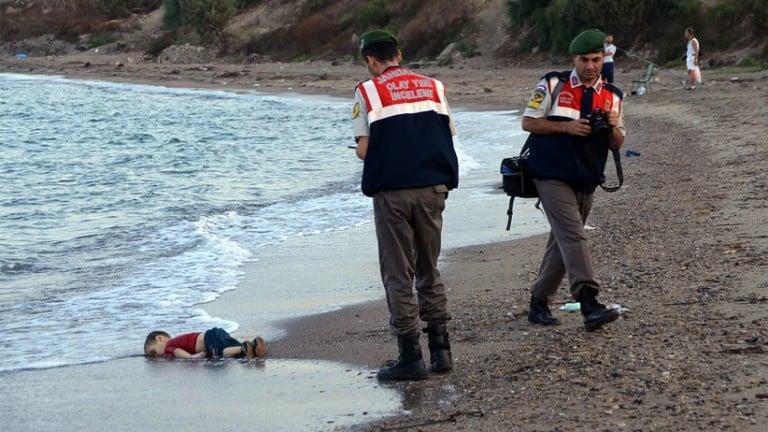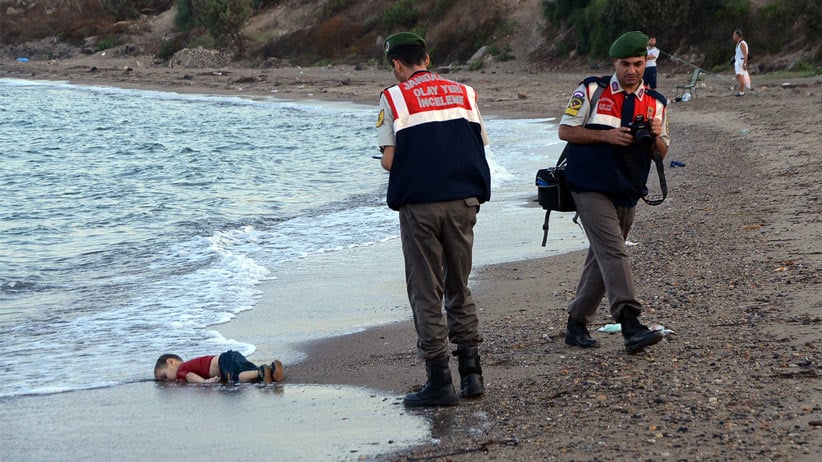Newsmakers 2015: Alan Kurdi, the boy on the beach
The heartbreaking image of three-year-old Alan Kurdi became the face of a wrenching global refugee crisis

Paramilitary police officers investigate the scene before carrying the lifeless body of Aylan Kurdi, 3, after a number of migrants died and a smaller number were reported missing after boats carrying them to the Greek island of Kos capsized, near the Turkish resort of Bodrum early Wednesday, Sept. 2, 2015. AP
Share

More than 3,500 asylum seekers have died trying to cross the Mediterranean this year. But the world really knows just one of their names. Three-year-old Alan Kurdi drowned off the Turkish resort town of Bodrum at the beginning of September. His brother Galib, 5, and their mother, Rehana, 35, perished that night as well, when waves swamped their overcrowded inflatable boat. So did nine or 10 other Syrians and Iraqis, whose fates are mourned only by their friends and families.
If it wasn’t for a single, searing picture, it’s likely that Kurdi would be forgotten too. The shot, taken by local news photographer Nilüfer Demir, caught the toddler in the red T-shirt and blue shorts lying face down in the sand, the dawn surf lapping gently at his dark hair. Arms at his sides, bum slightly in the air, Alan could have been asleep. A Turkish policeman stands nearby fiddling with a phone: The embodiment of our puny and powerless response to one of the greatest humanitarian crises the globe has ever known.
By late November, more than 750,000 poor and desperate people had successfully landed on Europe’s shores. Syrians, Afghans, Iraqis, Eritreans, Libyans and other nationalities: Some have come seeking better opportunities, but most are looking for safe haven, fleeing conflicts at home. The grinding, bloody 4½-year civil war in Syria is the principal problem, having displaced an estimated 12 million people. At least four million have left the country, crossing into neighbouring Lebanon, Iraq, Turkey and Jordan as refugees.
The Kurdi family was among them. They moved first from Damascus to their ancestral hometown of Kobani—where Alan was born in 2012—and later, when ISIS fighters advanced on the region, across the border into Turkey. The original plan had been to join family in British Columbia—Alan’s father, Abdullah, who survived that night, has a sister in Coquitlam. But after red tape foiled another sibling’s attempts to emigrate, Abdullah decided Europe was a better bet.
The smugglers charged about $4,000 a head for adults. Small children rode for free in their parents’ laps. Few of those who were packed into the dinghy could swim. The crossing to the Greek Island of Kos was short—just four kilometres—and the seas were supposed to be calm.
[widgets_on_pages id=”Newsmakers widget”]
The photo of the dead boy provoked international outrage, sorrow and acts of altruism. Donations to relief organizations spiked. The Swedish foreign minister cried when they showed it to her on TV. In Canada, then in the midst of a federal election campaign, it directly inspired the Liberal party’s pledge to bring 25,000 refugees to these shores by the end of 2015.
For a time, it seemed like the image might change everything. But then came debates over niqabs, closed frontiers and border fences in Europe, and terror attacks in Paris.
The underlying problems are no closer to being solved. As the international community declares war on the rebel Islamic State—the authors of the outrages in France, a mass bombing in Lebanon, and the downing of a Russian airliner over Egypt—Bashar al-Assad remains in power in Syria. His government forces have been responsible for three-quarters of all civilian deaths in the conflict, according to estimates by human rights organizations.
A political solution might be years away, complicated by rivalries between Russia and the United States, Saudi Arabia and Iran, all of whom support and supply various factions. Meanwhile, the flood of asylum seekers entering Europe grows—172,843 in September, 218,394 in October—taxing generosity, and threatening the very notion of a borderless, unified Europe. Millions more wait in camps, cities and slums, closer to home.
Alan Kurdi made us care. How much, is still to be determined.
Update